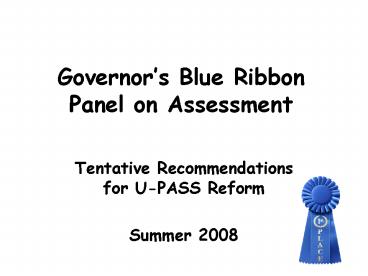Governors Blue Ribbon Panel on Assessment - PowerPoint PPT Presentation
1 / 21
Title:
Governors Blue Ribbon Panel on Assessment
Description:
Begins postsecondary admissions process. Assessment Summary ... Expanded concurrent/online college learning options that are rigorous ... – PowerPoint PPT presentation
Number of Views:19
Avg rating:3.0/5.0
Title: Governors Blue Ribbon Panel on Assessment
1
Governors Blue Ribbon Panel on Assessment
- Tentative Recommendations for U-PASS Reform
- Summer 2008
2
Purpose
- Examine current assessment system
- Develop a system that informs instruction
- Teachers
- Parents
- Students
- Assess basic skills
- Provide seamless assessment system K-16
- Encourage postsecondary education
3
Vision
- Upon high school graduation, every student
will have demonstrated the skills and knowledge
necessary to successfully pursue postsecondary
education and training.
4
Assessment Key Improve Teaching Learning
- Measurement at student level
- Based on growth
- Diagnostic/Instructional
- Disaggregated
- Uses technology
- Immediate results
- Multiple measures
- Seamless transition
- Comparative information
- Accountability
5
Tentative Proposal
- Eliminate Three Types of Tests
- Criterion-Referenced Tests (CRTs)
- Utah Basic Skills Competency Test (UBSCT)
- Iowa Test of Basic Skills (ITBS)
6
Tentative Proposal
- The Panel proposes to focus assessment on the
student in the classroom through a variety of
state-required assessments.
7
Computer-Adaptive Testing
- Reading, Language Arts, Math and Science
- Three times per year
- Identifies abilities of each student
- Gives national comparisons
- Features
- Growth scores
- Diagnostic information
- Individual targets
- Grade-level comparisons
- Immediate results
- Prescriptive intervention
8
Online Writing Assessment
- Grades 4-12
- Three times per year
- Increases writing frequency with immediate
feedback - Features
- Growth scores
- Diagnostic information
- Individual targets
- Grade-level comparisons
- Personalizes tutoring
9
English Language Learners
- Annual testing to determine growth in English
acquisition - Provides diagnostic information to personalize
learning solutions
10
Ongoing Reading Assessment
- K-3
- Locally selected, formative
- Computer-adaptive test
- 4-12
- If proficient, use computer-adaptive test
11
Kindergarten
- Locally developed assessments
- Pre- and post-test to measure growth
- Helps parents know how to help their child in
their first year of school
12
Transitional Assessments for All Students
- EXPLORE in 8th Grade
- PLAN in 10th Grade
- ACT in 11th Grade
- Accuplacer prior to 12 Grade course selection
- Features
- Measures academic preparedness
- Helps to plan classes and careers
- Begins postsecondary admissions process
13
Assessment Summary
CAT Computer-adapted testing in Math, Language
Arts, Reading and Science 3x / year WA ONLINE
Writing Assessment 3x / year ELL English
Language Learners will take annual test ORA
Locally selected ongoing reading assessments KG
Locally selected pre-post kindergarten
assessment EXPLORE In 8th grade PLAN In 10th
grade ACT In 11th grade Accuplacer Prior to
12th grade course selection Interim/Formative
At the discretion of the local district
14
Tentative Proposal
- The Panel proposes to increase expectations and
provide multiple means for qualifying for a high
school diploma
15
Basic Diploma
- Issued only upon demonstrated proficiency on one
of the following - Accuplacer
- ACT
- PLAN
- Computer-adaptive assessment
16
Exceptional Diplomas
- An IEP will guide graduation/diploma decisions
for students with disabilities - Value-added diplomas will be awarded to students
with high performance on proficiency measures
17
Tentative Proposal
- The Panel proposes continuation of
federally-mandated testing in randomly-selected
sites in grades 4 and 8 - National Assessment of Educational Progress
(NAEP)
18
Tentative Proposal
- The Panel proposes continuation of formative
assessments as determined by local boards of
education - Interim and formative assessment in kindergarten
through 12th grade in any subject - Use of Utah Test Item Pool System (UTIPS)
19
Tentative Proposal
- The Panel expects education and government
leaders to work together in behalf of every child
20
Key Expectations
- Universal use of Accuplacer
- Sufficient technology to drive efficient U-PASS
assessment - Increased resources for computer-assisted
learning - Immediate results that are transparent and
meaningful - Intense interventions/options
- Struggling and advanced students
- Funding
- Expanded concurrent/online college learning
options that are rigorous - Timely advisement for high school and higher
education students
21
Comments? Questions?































